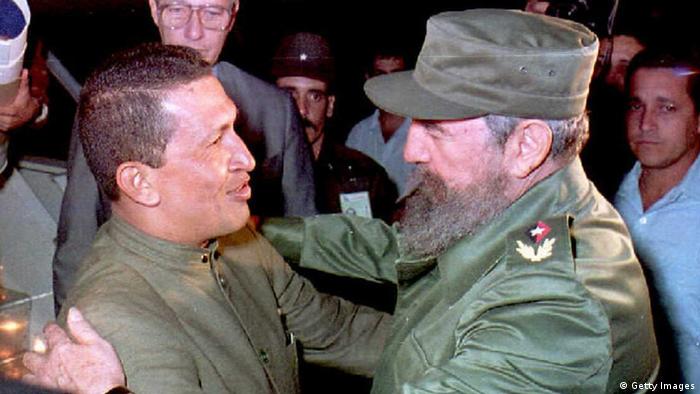The United States is accusing Cuba to control the political Elite of Venezuela and its armed forces and its intelligence services. Havana denies this, and calls on Washington to provide evidence.

Transport celebration of the Venezuelan military.
For US President Donald Trump the President of Venezuela, Nicolás Maduro, is a “Cuban puppet”. In a speech at the end of February in Florida, Trump was accused, moreover, of Cuba, to have military units in Venezuela stationed, and publicly threatened with a military Intervention, in Caracas, the self-transition President Juan Guaidó called help to the Power.
The Cuban government reacted promptly. The accusations were despicable, said Cuba’s foreign Minister Bruno Rodríguez, and called on the United States, evidence of the alleged stationing of troops and the Infiltration of the military in Venezuela.
The accusations in the address of Cuba are not, however, collected only from the United States, but also of the organization of American States (OAS), non-governmental organisations and former members of the Venezuelan armed forces.

Solidarity with Tradition: Cuba’s President Díaz-Canel and Venezuelan President Nicolás Maduro.
“The Cuban foreign Minister calls for irrefutable evidence, because Caracas and Havana, hide them well,” says Dr. Ivo Hernández from the Institute for political science at the University of Münster. President Maduro have control over the in the country disseminated information and data to consider the economic indicators such as the real inflation rate, but also information about the extent of the Cuban presence in Cuba under lock and key. “But there are enough former members of the Venezuelan armed forces have been the strong influence of the Cuban military described,” says Ivo Hernández, opposite the Deutsche Welle.
Indirect Evidence
Evan Ellis, a Professor at the Institute for Strategic Studies (SSI) at the Army war College in Carlisle in the U.S. state of Pennsylvania assumes that there is enough indirect evidence of Cuban influence on the Venezuelan armed forces. “If the United States have information, then you are of course strictly confidential,” said Ellis in an interview with DW. “If the Americans put this information on the table, win their allegations on credibility; but, under certain circumstances, the lives of their informants, and place your methods of investigation open,” stresses Ellis.
For the U.S. military experts, the statements of many Venezuelans are undeniable, the reports about it, to have day-to-day direct contact with Cubans. Including teachers, sports coaches, Doctors, technicians, and military personnel be. “It is not excluded that a part of them is working with the Cuban secret service together,” says Ellis.

Hugo Chávez and Fidel Castro met for the first time in 1994 in Cuba.
And when Cuba began its influence in Venezuela to expand? In this issue, the experts are not quite agreed. Some believe that this influence even before the coup attempt against former Venezuelan President Hugo Chávez on 11. April 2002. In any case, this event is among the observers as a turning point.
Revolutionary Expansionism
That the Cuban leadership of Fidel Castro shortly after the 1959 Revolution, active Attempts to export the Cuban model of Revolution to other countries – including Venezuela – is undisputed. “Castro’s plans could only be realized, as in Caracas, a tamper-came visible individual to Power. This Person was reigned Hugo Chávez, of Venezuela from 1999 until his death in 2013,” says Ivo Hernández. In his view, Cuba began over 15 years ago, to export the political, social and economic systems of control, which it had inherited from the Soviet Union to Venezuela.
“Day of submission” (Días de sumisión) is the name of the book, in which the Venezuelan Journalist Orlando Avendaño Castro’s expansion describes the collectivist plans for Venezuela long before the government of Hugo Chávez. “My research will focus on the period from 1959 to 1994, the year when Castro and Chavez met for the first time, and the latter was immediately hypnotized by Castro,” says Avedaño. On the basis of numerous sources and Interviews with time witnesses of the early Cuban describes Avedano support of revolutionary groups in Venezuela, and the involvement in the coup attempt of 4. February 1992, which was led by a young Lieutenant Colonel named Hugo Chávez. “The Rest is history,” says Orlando Avedaño.